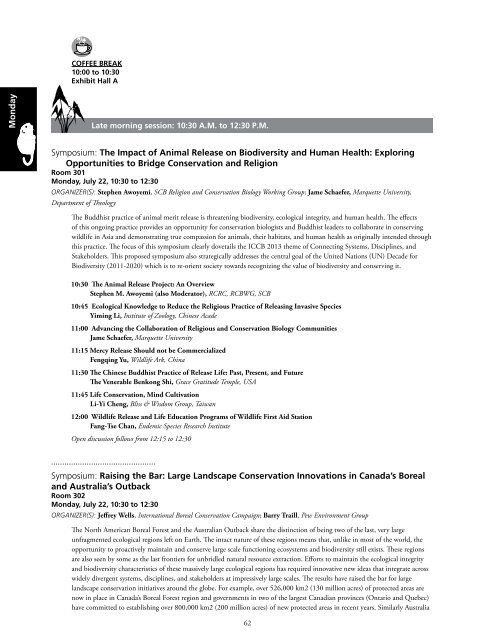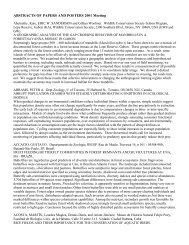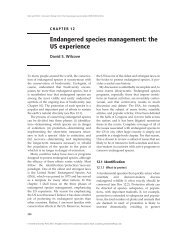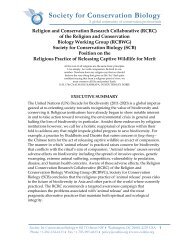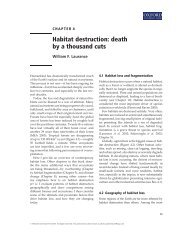ICCB 2013 Program - Society for Conservation Biology
ICCB 2013 Program - Society for Conservation Biology
ICCB 2013 Program - Society for Conservation Biology
You also want an ePaper? Increase the reach of your titles
YUMPU automatically turns print PDFs into web optimized ePapers that Google loves.
Coffee Break<br />
10:00 to 10:30<br />
Exhibit Hall A<br />
Monday<br />
late morning session: 10:30 a.m. to 12:30 p.m.<br />
Symposium: The Impact of Animal Release on Biodiversity and Human Health: Exploring<br />
Opportunities to Bridge <strong>Conservation</strong> and Religion<br />
Room 301<br />
Monday, July 22, 10:30 to 12:30<br />
Organizer(s): Stephen Awoyemi, SCB Religion and <strong>Conservation</strong> <strong>Biology</strong> Working Group; Jame Schaefer, Marquette University,<br />
Department of Theology<br />
The Buddhist practice of animal merit release is threatening biodiversity, ecological integrity, and human health. The effects<br />
of this ongoing practice provides an opportunity <strong>for</strong> conservation biologists and Buddhist leaders to collaborate in conserving<br />
wildlife in Asia and demonstrating true compassion <strong>for</strong> animals, their habitats, and human health as originally intended through<br />
this practice. The focus of this symposium clearly dovetails the <strong>ICCB</strong> <strong>2013</strong> theme of Connecting Systems, Disciplines, and<br />
Stakeholders. This proposed symposium also strategically addresses the central goal of the United Nations (UN) Decade <strong>for</strong><br />
Biodiversity (2011-2020) which is to re-orient society towards recognizing the value of biodiversity and conserving it.<br />
10:30 The Animal Release Project: An Overview<br />
Stephen M. Awoyemi (also Moderator), RCRC, RCBWG, SCB<br />
10:45 Ecological Knowledge to Reduce the Religious Practice of Releasing Invasive Species<br />
Yiming Li, Institute of Zoology, Chinese Acade<br />
11:00 Advancing the Collaboration of Religious and <strong>Conservation</strong> <strong>Biology</strong> Communities<br />
Jame Schaefer, Marquette University<br />
11:15 Mercy Release Should not be Commercialized<br />
Fengqing Yu, Wildlife Ark, China<br />
11:30 The Chinese Buddhist Practice of Release Life: Past, Present, and Future<br />
The Venerable Benkong Shi, Grace Gratitude Temple, USA<br />
11:45 Life <strong>Conservation</strong>, Mind Cultivation<br />
Li-Yi Cheng, Bliss & Wisdom Group, Taiwan<br />
12:00 Wildlife Release and Life Education <strong>Program</strong>s of Wildlife First Aid Station<br />
Fang-Tse Chan, Endemic Species Research Institute<br />
Open discussion follows from 12:15 to 12:30<br />
...............................................<br />
Symposium: Raising the Bar: Large Landscape <strong>Conservation</strong> Innovations in Canada’s Boreal<br />
and Australia’s Outback<br />
Room 302<br />
Monday, July 22, 10:30 to 12:30<br />
Organizer(s): Jeffrey Wells, International Boreal <strong>Conservation</strong> Campaign; Barry Traill, Pew Environment Group<br />
The North American Boreal Forest and the Australian Outback share the distinction of being two of the last, very large<br />
unfragmented ecological regions left on Earth. The intact nature of these regions means that, unlike in most of the world, the<br />
opportunity to proactively maintain and conserve large scale functioning ecosystems and biodiversity still exists. These regions<br />
are also seen by some as the last frontiers <strong>for</strong> unbridled natural resource extraction. Ef<strong>for</strong>ts to maintain the ecological integrity<br />
and biodiversity characteristics of these massively large ecological regions has required innovative new ideas that integrate across<br />
widely divergent systems, disciplines, and stakeholders at impressively large scales. The results have raised the bar <strong>for</strong> large<br />
landscape conservation initiatives around the globe. For example, over 526,000 km2 (130 million acres) of protected areas are<br />
now in place in Canada’s Boreal Forest region and governments in two of the largest Canadian provinces (Ontario and Quebec)<br />
have committed to establishing over 800,000 km2 (200 million acres) of new protected areas in recent years. Similarly Australia<br />
62


